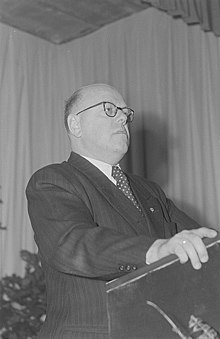
Back كارل شردوان ARZ Karl Schirdewan German Karl Schirdewan Estonian Karl Schirdewan French Ширдеван, Карл Russian
Karl Schirdewan | |
|---|---|
 Schirdewan in 1952 | |
| First Secretary of the Socialist Unity Party in Bezirk Leipzig | |
| In office 26 July 1952 – December 1952 | |
| Second Secretary |
|
| Preceded by | himself (Saxony) |
| Succeeded by | Paul Fröhlich (1953) |
| First Secretary of the Socialist Unity Party in Saxony | |
| In office February 1952 – 26 July 1952 | |
| Second Secretary |
|
| Preceded by | Ernst Lohagen |
| Succeeded by | himself (Bezirk Leipzig) Hans Riesner (Bezirk Dresden) Walter Buchheim (Bezirk Karl-Marx-Stadt) |
| Member of the Volkskammer | |
| In office 23 July 1952 – 24 February 1958 | |
| Preceded by | Ernst Lohagen |
| Succeeded by | Harry Bachmann |
| Central Committee Secretariat responsibilities | |
| 1956-1958 | Cadre Affairs |
| 1953-1958 | KPD Working Office |
| 1953-1958 | West |
| 1953-1958 | Woman |
| 1953-1958 | Youth |
| 1953-1955 | Neuer Weg |
| 1952-1956 | Leading Party Organs and Mass Organizations |
| Personal details | |
| Born | 14 May 1907 Stettin, Province of Pomerania, Kingdom of Prussia, German Empire (now Szczecin, Poland) |
| Died | 14 July 1998 (aged 91) Potsdam, Brandenburg, Germany |
| Political party | Party of Democratic Socialism (1989–1998) |
| Other political affiliations | Socialist Unity Party (1952–1989) Communist Party of Germany (1925–1946) |
| Spouse | Gisela Schirdewan |
| Children | 4 |
| Relatives |
|
| Occupation |
|
| Awards | Patriotic Order of Merit, 1st class |
Central institution membership
Other offices held
| |
Karl Schirdewan (14 May 1907 – 14 July 1998) was a German Communist activist who after World War II became a top East German politician.[1][2]
During the mid 1950s, Schirdewan was seen as a potential successor to Walter Ulbricht but fell out of favour in 1958.[3] Ulbricht continued to lead the government until 1971, while 1958 was the year in which Schirdewan was thrown out of the Politburo[4] and placed in charge of the National Archives at Potsdam,[2] a position from which he retired in 1964[4] or 1965.[1]
- ^ a b Bernd-Rainer Barth; Helmut Müller-Enbergs. "Schirdewan, Karl (eigtl.: Aretz) * 14.5.1907, † 14.7.1998 Mitglied des Politbüros des ZK der SED". Wer war wer in der DDR?. Ch. Links Verlag, Berlin & Bundesstiftung zur Aufarbeitung der SED-Diktatur, Berlin. Retrieved 15 December 2015.
- ^ a b David Childs (10 August 1998). "Parteifeinde und Philosophen: Im Brandt-Bericht erwähnte DDR-Prominente". The Independent. Retrieved 15 December 2015.
- ^ "Gestorben - Karl Schirdewan .... das seltene Beispiel eines lernfähigen Kommunisten in der DDR-Führung.". Der Spiegel (online). 20 July 1998. Retrieved 15 December 2015.
- ^ a b "Parteifeinde und Philosophen: Im Brandt-Bericht erwähnte DDR-Prominente". Der Spiegel. Der Spiegel (online). 2 February 1967. Retrieved 16 December 2015.